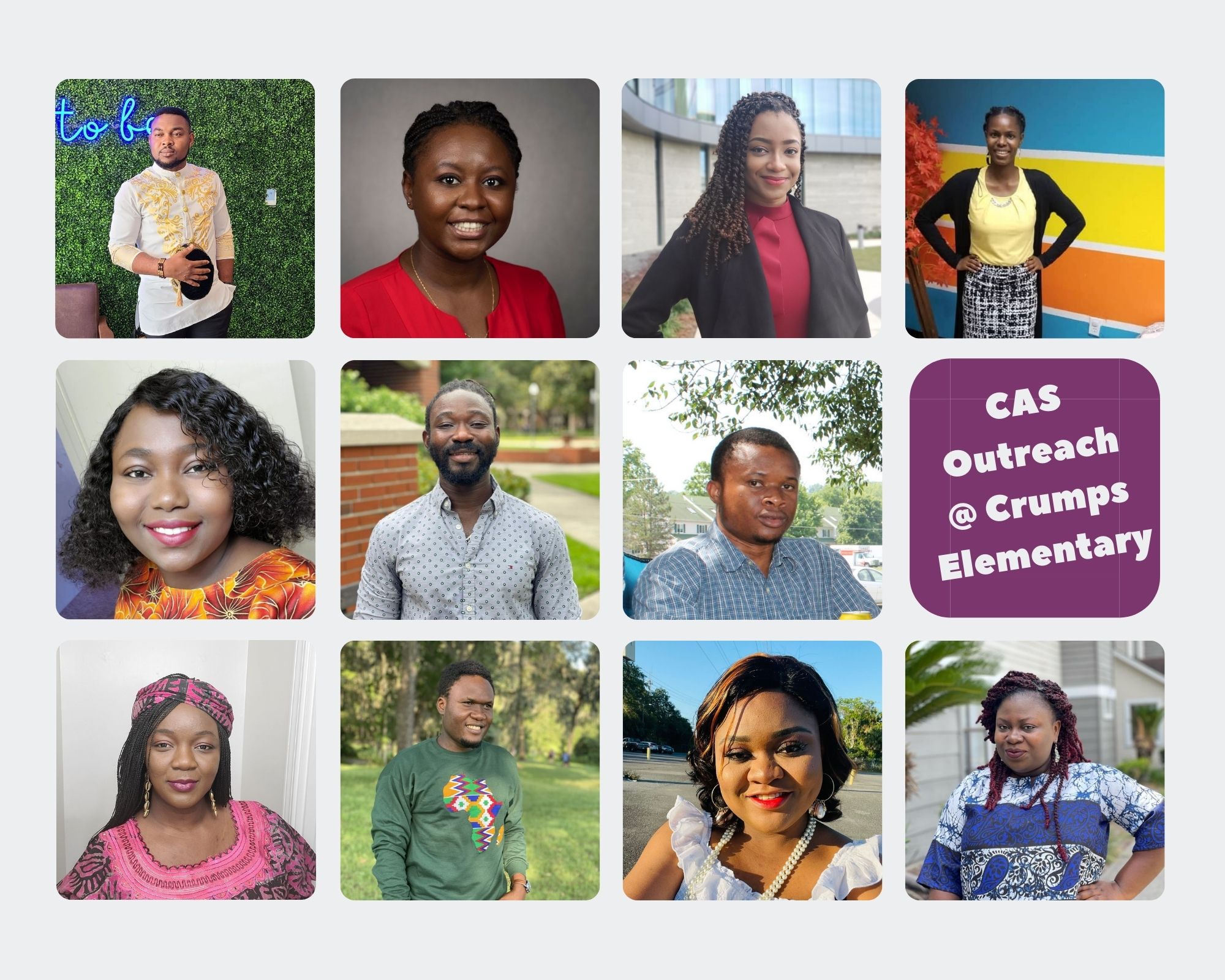The Crump Elementary School in Memphis TN hosted a virtual Africa Day on May 25, 2021. Ms. Tanisha William- the organizer and teacher at Crumps elementary School is an alumnus of the Summer Teacher’s Institute on Africa African. Graduate Students were present for this awesome event. We had 11 African Graduate Students present. This was a day long event, hence we had various presenters for different times and grade levels.
Felicity Tackey-Otoo – Ghana Textile Fabrics and Meanings
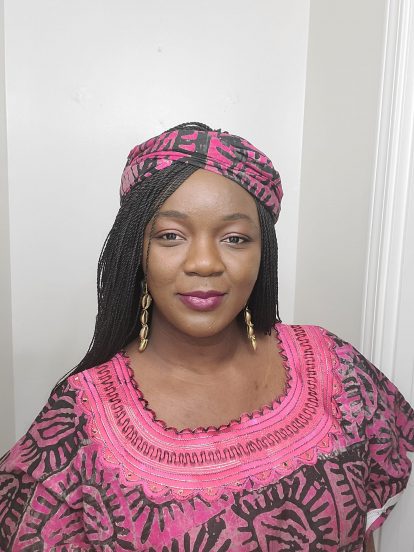 She presented on the history of wax print and the selected meanings. She also explained the meanings of the proverbs behind the fabrics. She selected specific fabrics with relevant meanings to the Elementary students. Fabrics such as Sika Wo Ataban (Money has wings), Ahwene pa n’kasa (royal beads don’t rattle) and ahwede po (sugarcane). She also told them about fabrics that were named after personalities like Kwame Nkrumah, Nelson Mandela, Barack and Michelle Obama. She showed them the video of the Sweet Talk ban titled Angelina with is also name of a fabric popularly called Dashiki in America.
She presented on the history of wax print and the selected meanings. She also explained the meanings of the proverbs behind the fabrics. She selected specific fabrics with relevant meanings to the Elementary students. Fabrics such as Sika Wo Ataban (Money has wings), Ahwene pa n’kasa (royal beads don’t rattle) and ahwede po (sugarcane). She also told them about fabrics that were named after personalities like Kwame Nkrumah, Nelson Mandela, Barack and Michelle Obama. She showed them the video of the Sweet Talk ban titled Angelina with is also name of a fabric popularly called Dashiki in America.
Felicity is a PhD student at the Rinker School of Construction Management
Oyindamola Oyebade- Yoruba Culture
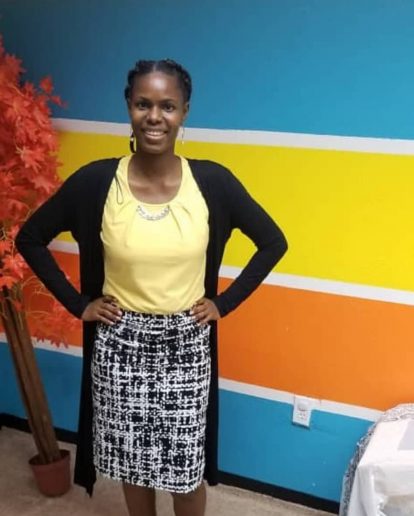 Oyin talked about some prominent Yoruba culture with the students. The Yoruba culture can also be found outside of the Western region of Nigeria, Brazil, Benin Republic and Togo. She talked about the Yoruba naming system; how a child is named on the 8th day after birth by a respected elder within the community. The Yorubas also have indigenous food like ofada rice and pounded yam. They consume lots of cassava and maize. She talked about one of the ancient Yoruba city called Abeokuta, the name was gotten from an ancient Olumo rock. The name of the city literally means “under the rock”. Abeokuta city houses the first church in Nigeria.
Oyin talked about some prominent Yoruba culture with the students. The Yoruba culture can also be found outside of the Western region of Nigeria, Brazil, Benin Republic and Togo. She talked about the Yoruba naming system; how a child is named on the 8th day after birth by a respected elder within the community. The Yorubas also have indigenous food like ofada rice and pounded yam. They consume lots of cassava and maize. She talked about one of the ancient Yoruba city called Abeokuta, the name was gotten from an ancient Olumo rock. The name of the city literally means “under the rock”. Abeokuta city houses the first church in Nigeria.
Francis Semwaza- Africa: What we know and what we don’t know.
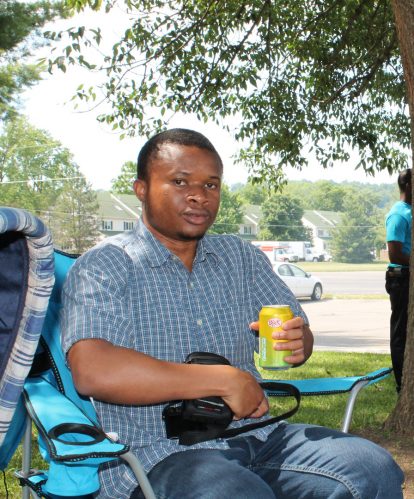 Francis’ presentation offered a basic introduction about the continent of Africa. It covered issues including countries in Africa, languages in Africa, popular features and landscapes as well as Africa’s notable figures during the liberation movements to present.
Francis’ presentation offered a basic introduction about the continent of Africa. It covered issues including countries in Africa, languages in Africa, popular features and landscapes as well as Africa’s notable figures during the liberation movements to present.
Francis is currently a doctoral student in anthropology at the University of Florida
Bisola Ajibade- Nigerian Tourist Attractions & Food
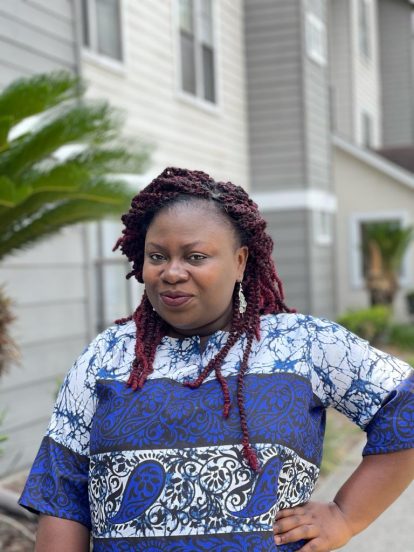 Bisola gave two talks; The first one was on” Tourist’s Attractions in Nigeria”. It was a very informative talk, which also helped to correct stereotypes about Nigeria. The presentation included playing a video, which was a virtual tour of Yankari National Park in Nigeria.
Bisola gave two talks; The first one was on” Tourist’s Attractions in Nigeria”. It was a very informative talk, which also helped to correct stereotypes about Nigeria. The presentation included playing a video, which was a virtual tour of Yankari National Park in Nigeria.
The second talk was on Nigerian cuisine, which made the students interested in cooking and eating Nigerian food.
Bisola is a Masters student in German Studies.
Pearl Ebea- African Hair and Styling
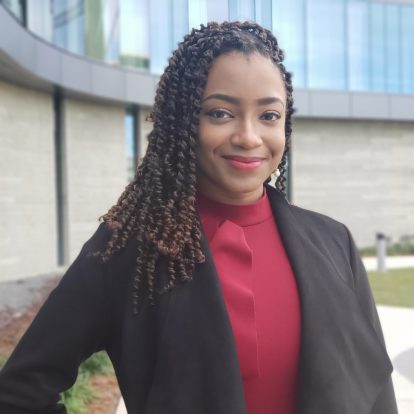 Pearl presented on African Hair and Styling. In her presentation she talked about African hair history and how different hairstyles were used, in times past, as a unique means of identifying people of different tribes, ranks, religions and so on. She also showed the students examples of common hairstyles in Nigeria, as well as their traditional names and meanings. The students also learnt about the different African hair types/textures and how to take care of African hair.
Pearl presented on African Hair and Styling. In her presentation she talked about African hair history and how different hairstyles were used, in times past, as a unique means of identifying people of different tribes, ranks, religions and so on. She also showed the students examples of common hairstyles in Nigeria, as well as their traditional names and meanings. The students also learnt about the different African hair types/textures and how to take care of African hair.
The students enjoyed the presentation and asked insightful questions. Some mentioned that they had made similar hairstyles before.
Pearl is a PhD student in Nutritional Sciences.
Daniel Alabi- African Innovators
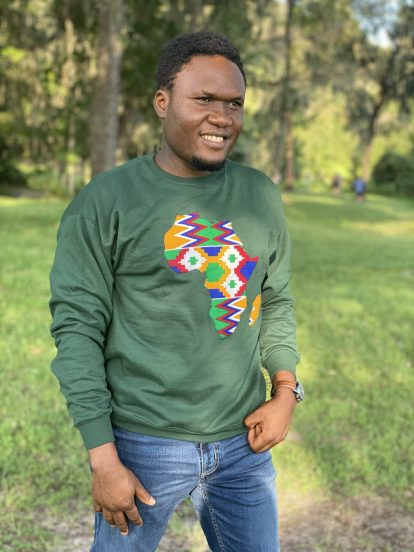 Daniel was able to elaborate on what it means to be a scientist and an inventor. Afterwards, he highlighted some of the notable black inventors and scientists, some dead, some still alive.
Daniel was able to elaborate on what it means to be a scientist and an inventor. Afterwards, he highlighted some of the notable black inventors and scientists, some dead, some still alive.
The presentation was open for questions, and the students asked very pointed and useful questions. Some noteworthy question was about what age they can become scientists to which the answer was now, they can be scientists now.
Daniel is an Electrical Engineering PhD Student
Rufus Theophilus- Nigeria: The Gaint of Africa
 Rufus participated as a key speaker during the celebration of “African Day” at the Crump Elementary schools, where he delivered a talk titled “Nigeria: The Giant of Africa”. The talk highlighted reasons Nigeria is often regarded as the giant of Africa, some cultural practices and traditions that define her uniqueness within her states/ethnicities and among other African nations and/or the rest of the world. The pupils also learned about interesting places to visit in Nigeria and things to do in those places. The presentation ended with a quiz and the pupils had the opportunity to ask pertinent questions.
Rufus participated as a key speaker during the celebration of “African Day” at the Crump Elementary schools, where he delivered a talk titled “Nigeria: The Giant of Africa”. The talk highlighted reasons Nigeria is often regarded as the giant of Africa, some cultural practices and traditions that define her uniqueness within her states/ethnicities and among other African nations and/or the rest of the world. The pupils also learned about interesting places to visit in Nigeria and things to do in those places. The presentation ended with a quiz and the pupils had the opportunity to ask pertinent questions.
Rufus Theophilus is a doctoral student of the Nutritional Science program
Diane Ezeh Aruah- Marriage Culture in Igboland
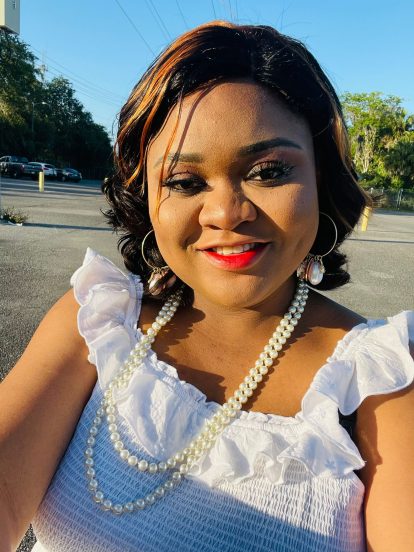 Diane presented on the marriage tradition in Nigeria, Igboland to be precise. She explained the stages of marriage in Igboland, ranging from the moment couples meet, to when they complete their white wedding. She educated the students on how marriage is valued, including the values of bride price, bride’s traditional attires, decorations, food, gifts and the bridesmaids’ dances. She enlightened the students on the role of family and kinship in many Nigerian marriage cultures. The students were enamored by the traditional marriage rites and marveled at how beautiful and cultural Igbo people in Nigeria have designed their marriage to be. They also wished that they could witness one in future. One student said, “I’d like to marry in this culture, so I get to enjoy all of these”.
Diane presented on the marriage tradition in Nigeria, Igboland to be precise. She explained the stages of marriage in Igboland, ranging from the moment couples meet, to when they complete their white wedding. She educated the students on how marriage is valued, including the values of bride price, bride’s traditional attires, decorations, food, gifts and the bridesmaids’ dances. She enlightened the students on the role of family and kinship in many Nigerian marriage cultures. The students were enamored by the traditional marriage rites and marveled at how beautiful and cultural Igbo people in Nigeria have designed their marriage to be. They also wished that they could witness one in future. One student said, “I’d like to marry in this culture, so I get to enjoy all of these”.
Diane is a doctoral candidate at the College of Journalism and Communications
Ange Asanzi- Wildlife and Biodiversity in Central Africa
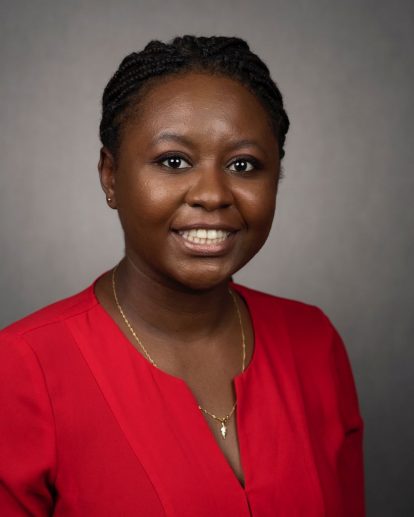 The presentation titled wildlife and biodiversity in Central Africa covered an introduction of the fauna and flora of the 7 countries in Central Africa. Ange agave examples of animals endemic to each country, such as the Okapi, Congo peacock, African manatee, mountain gorilla and bonobo. She also explained the functions of the Congo Basin rainforest and Congo River and how the later serves as a source of livelihoods for millions of people and also a means of transportation. It was an interactive presentation, and the kids asked a lot of questions about animals, forests and people in Africa.
The presentation titled wildlife and biodiversity in Central Africa covered an introduction of the fauna and flora of the 7 countries in Central Africa. Ange agave examples of animals endemic to each country, such as the Okapi, Congo peacock, African manatee, mountain gorilla and bonobo. She also explained the functions of the Congo Basin rainforest and Congo River and how the later serves as a source of livelihoods for millions of people and also a means of transportation. It was an interactive presentation, and the kids asked a lot of questions about animals, forests and people in Africa.
Ange is a recent graduate of the Masters in Development Program (MDP)
Mustapha Mohammed- West African Women in Power
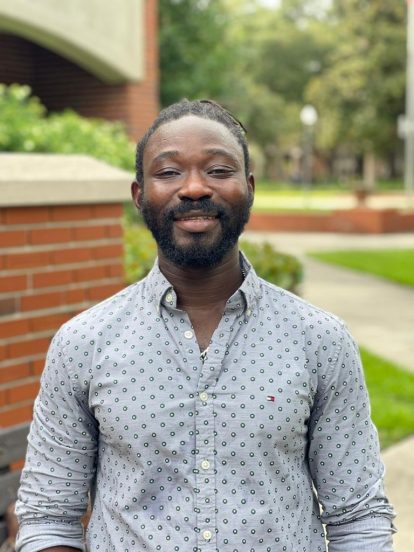
Mustapha is a PhD Candidate in Archeology at the University of Florida.
Mustapha discussed the topic ‘Empowering Women: Lessons from West African History and Culture.’ Students were happy to learn that gender-binary was not pronounced in most West African cultures before Arab-European experiences. The practice is corroborated by indigenous West African languages, where gender pronouns are essentially nonexistent. Some of the students expressed how they were fascinated and encouraged by the stories of Nana Yaa Asantewaa, Queen Yenenga, and Queen Nzinga Mbande to aspire for higher leadership roles in the future.
Mosunmola Adeojo- Yoruba Traditional Wedding
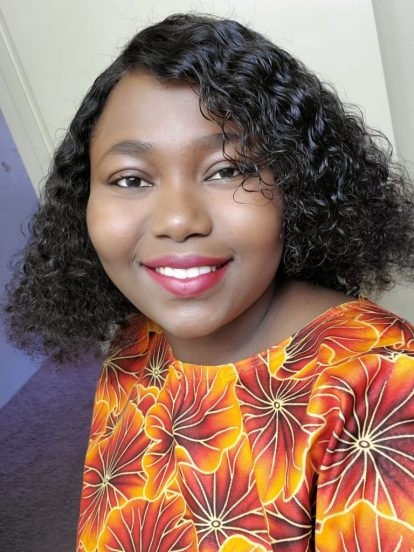
Mosúnmọ́lá presented Nigerian Traditional Weddings with focus on Yorùbá engagement ceremony. She explained the significance of marriage among Yorùbá people, the symbolism of items on the engagement list, and marriage as the joining of two families. To show how traditional weddings are not necessarily ancient practices but remain relevant to Nigerians today, Mosúnmọ́lá shared clips from Instagram and Youtube with the class.
Mosumola is a PhD student in English.

